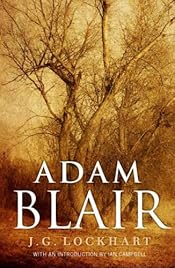Adam Blair by John Gibson Lockhart
Posted in Reading Reviewed, Scottish Fiction, Scottish Literature at 12:00 on 14 October 2018
Also known as “Some Passages in the Life of Adam Blair, Minister of the Gospel at Cross-Meikle.”
The Saltire Society, 2007, 172 p, plus xxii p Introduction by Ian Campbell and vi p Notes.
One of the 100 best Scottish Books.

This book squarely targets that intersection of Scottish life with religion which so firmly shaped the national character during the centuries of the Calvinist ascendancy – not always to the good. A critic quoted in the introduction (which again it is wise to avoid till after the book itself has been read) says its characters are “earnestly attached to a religion which makes little appeal to taste, and rejects every allurement of art,” while another opines that “Lockhart feels that in destroying the presence (or indeed the possibility) of beauty in the services of the national church the Scottish Reformers damaged the national imagination.” Yet there is a glimmer of salvation to be found as the book proceeds to its close, its unfolding providing signs of a first crack in that edifice of stern righteousness in the attitude of the populace to a fall from grace.
First published in 1822, Adam Blair is, like the works of Lockhart’s father-in-law Walter Scott, to modern eyes over-written. It also has an odd approach with regard to the placement of commas. Parenthetically Lockhart provides a comment on the passing of time with the thought, “in those days, Scottish widows and Scottish grandmothers were not a whit ashamed of being dressed like widows and grandmothers.”
The book’s focus is almost entirely on Adam Blair, minister of the parish of Cross-Meikle, situated somewhere in the Argyll/Dunbartonshire area. At the novel’s beginning, Blair’s wife has just died and is buried in the churchyard, her body lying beside their three dead children. Other characters appear but are not explored in any depth at all. Even his surviving daughter Sarah is only a fleeting presence. The measure of consolation Blair finds in his daily act of worship, shared in by the whole household, is shown in all its bleak stoicism.
Change begins to come with the arrival at Cross-Meikle of Mrs Blair’s cousin Charlotte, a woman with a colourful past – including a divorce from the young man she had eloped with and who in turn ran off with an Italian opera singer. Her devotion to Sarah commends her to Blair and when she rescues Sarah from drowning his gratitude is effusive. Wagging tongues promote Charlotte’s father to demand her return to the family home, despite Blair’s protestations of innocence. His decision to follow her there provokes the novel’s crisis point. Four lines of eight asterisks begin Chapter 14, masking the exact nature of Blair’s lapse but we are in no doubt as to what it was. He confesses his sin to the Glasgow Presbytery and is stripped of his pastoral role. The interesting thing is the response of his parishioners; not condemnation, but understanding. His subsequent taking of a cottage in the town and working the land is seen as a confirmation of his belonging to the community and a penance beyond duty.
The story of Blair, his struggles with and against his conscience, is an illustration of the hold Calvinism exerted on the Scottish psyche, its baleful effects and meagre consolations. One of the 100 best Scottish novels? Yes, in terms of the significance of its subject matter to the Scottish historical identity.
Pedant’s corner:- in the Introduction; “the two or three across of land” (acres of land. This is correct in the actual text in the book!) The introduction also quotes the same passage twice, the second time in a longer form, and has an extraneous single end quotation mark plus a varied approach to the placing of the numbers indicating a footnote. In the Notes; Jesus’ (Jesus’s.) Otherwise; as in Scott we have shrunk for shrank, rung for rang, sunk for sank, sung for sang; Benlomond (now always written Ben Lomond,) “a fine herd of cattle were passing” (a herd was passing,) faultered (faltered. Is faultered an archaic spelling?) “The family sit” (the family sits,) “in twos arid threes” (twos and threes; is this possibly a compositor’s misreading of the original handwritten manuscript?) “A merry party were busy curling on the ice” (a merry party was busy,) “fourthly and lady, the gay lady” (context demands “fourthly and lastly” – another compositor’s misreading?) “Mrs Ardens beautiful face” (Arden’s,) Loch-Fine (nowadays spelled Loch Fyne,) bosomn (bosom,) Pere la Chaise (Père Lachaise,) scorm (scorn,) “beneath then” (beneath them,) boundlng (bounding,) roundedwith (rounded with,) Camnpbell (Campbell,) “what he most do” (must do,) “in few minutes” (in a few minutes,) “waive of his hand” (wave,) perfecfly (perfectly,) imme diately (immediately,) “not with, out some suspicion” (not without,) a missing full stop.
